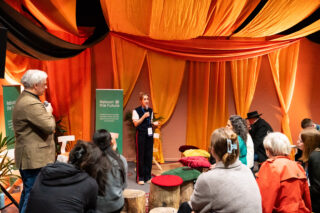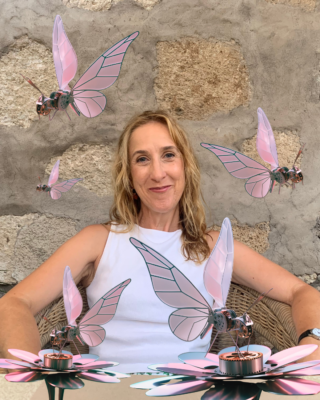Who is your ally, and why? By Stephanie Heath
30 Jul
Every month, we dive deep into a topic that resonates with our mission.
This month's question:
Who is your ally, and why?
Reflect on this month's question and use it as a starting point for conversations or personal reflections on kindness and empathy.
If you find it challenging or feel stuck, remember you're not alone. Each month, our changemakers offer insights and reflections to inspire us all to bring the Golden Rule into everyday life, making our world more compassionate and understanding.
Listen
Hear from Stephanie Heath, as she shares her personal insights in response to this month's thought-provoking question.
Hi. I’m Stephanie Heath. I’m on the leadership team at Lutterworth & Villages Foodbank. Supported by St Mary’s Church in Lutterworth, we’re one of the Trussell Trust’s network of over 1000 foodbank centres in the UK. We’re committed to working towards a future where nobody in this country needs to use a foodbank.
The question I’ve been asked to explore is ‘Who is your ally, and why?’ I love this question! It’s very direct. No messing. But it turns out that although the question itself is clear, it elicited a more intricate pattern of responses in my head than I was expecting.
I’m pretty sure I know what an ally is. But I checked anyway. In the Collins English Dictionary the definition of ally, as a verb, means ‘to unite, or be united, especially formally, as by treaty, confederation, or marriage’ or ‘to connect or be related, as through being similar or compatible’. As a noun, an ally is ‘a country, person or group allied with another’, or ‘a person or group that supports another, especially in the face of opposition’. So, united, connected, related. It’s a relationship. A relationship with some essential qualities, I think. Qualities such as respect, and compassion. Qualities like trust, and dignity. And reliability.
I suggest that building and maintaining such a relationship, which has those qualities, is quite a big responsibility. Why do I think that? Because to be an ally (a good one) requires continuous practice. Practice good communication; being open, clear and honest. Practice paying attention; what is going on here, and why? The author Chimamanda Ngozi Adichie suggests that when we pay attention to someone it is “one of the most beautiful acts of kindness”. The world can always do with more kindness. Practice working together, genuinely collaborating. Practice recognizing people’s skills and asking for help. So, I’m landing on the words relationship and responsibility as I consider what an ally might be. How else can I recognize an ally?
I think that an ally empowers you. They acknowledge and appreciate where you are, and where you want to be. They ask good questions - What is your vision? How can I support you in realizing it? For a relationship to be at its most effective, we must believe that our ally is acting with the best of intentions, and with our best interests at heart. We must trust them. We must trust that our allies will be steadfast, but also that they will have the resilience to flex when things shift beneath our feet – for this is when we may need the most support. This is when our relationship is put to the test.
At the foodbank we’re practicing being an ally to people living in poverty. As well as providing emergency food, toiletries and other household items we also try to support those who are struggling by listening to them. Our wonderful volunteers listen to our visitors when it feels to them like nobody else will. We listen as they tell us how they’ve got to this point; what has finally driven them to ask for help. It takes a lot of courage to share those experiences. People need to know they can trust us.
“Nothing about us, without us, is for us” is a motto that originated in the disability rights movement. It calls on policymakers to put the individual front and centre in all decisions about their life. At the foodbank we’re now practicing this. Bringing people with lived experience of poverty into spaces where they can have a say in how the service is delivered, and what it might look like in the future. We’re inviting them to collaborate with us to bring about change so that nobody needs a food bank. We’re practicing building trust, so that everyone can feel confident to provide input and to hold us accountable.
We want to demonstrate that we’re reliable. That we take our responsibilities seriously. We want to better understand our community, to find out what people’s actual needs and challenges are, and what would constitute real help (as opposed to us offering the kind of help we assume people want or need). In turn, we rely on others to act as our allies in the fight against poverty.
The Trussell Trust works in partnership with many organisations, including running the ‘Guarantee Our Essentials’ campaign with the Joseph Rowntree Foundation. This calls for the basic rate of Universal Credit to at least cover the cost of necessities like food, household bills and travel. So that we have a social security system that allows everyone to afford the essentials. Our foodbank has created a closer partnership with Citizens’ Advice; we now have a dedicated Citizens’ Advice worker in our sessions to give visitors easy access to money advice and support.
Individual foodbanks partner with community-based organisations and local referral agencies such as schools, GPs, and housing officers. With social workers, charities, and churches, to name a few. To ensure that people can get effective support to address the cause of their crisis. To maximise the chances of people receiving wrap-around care. At a time when many are concerned about making ends meet, knowing that people care makes a real difference. Knowing that you have an ally. Someone you trust.
People in the local community generously donate food and funds to the foodbank to demonstrate that they care. And of course, we simply couldn’t operate without our incredibly committed volunteers; they really are an amazing team. All these hard-working, big-hearted people are our allies, helping us to bring a more tolerant and compassionate community into being. A community that is united. Connected. Related. A community that acknowledges its responsibility to one another. Acting with love and kindness. A community that pays attention. Because we can’t take our allies for granted. Or assume that we ourselves are always being good allies. We must keep practising.
Get in touch
LinkedIn - Stephanie Heath
Instagram - @stephanieheath
X: @sseheath
Why not reflect on the question yourself?
It's your turn to explore the themes of partnership in your life.
Remember, every voice matters in shaping a more compassionate world.


